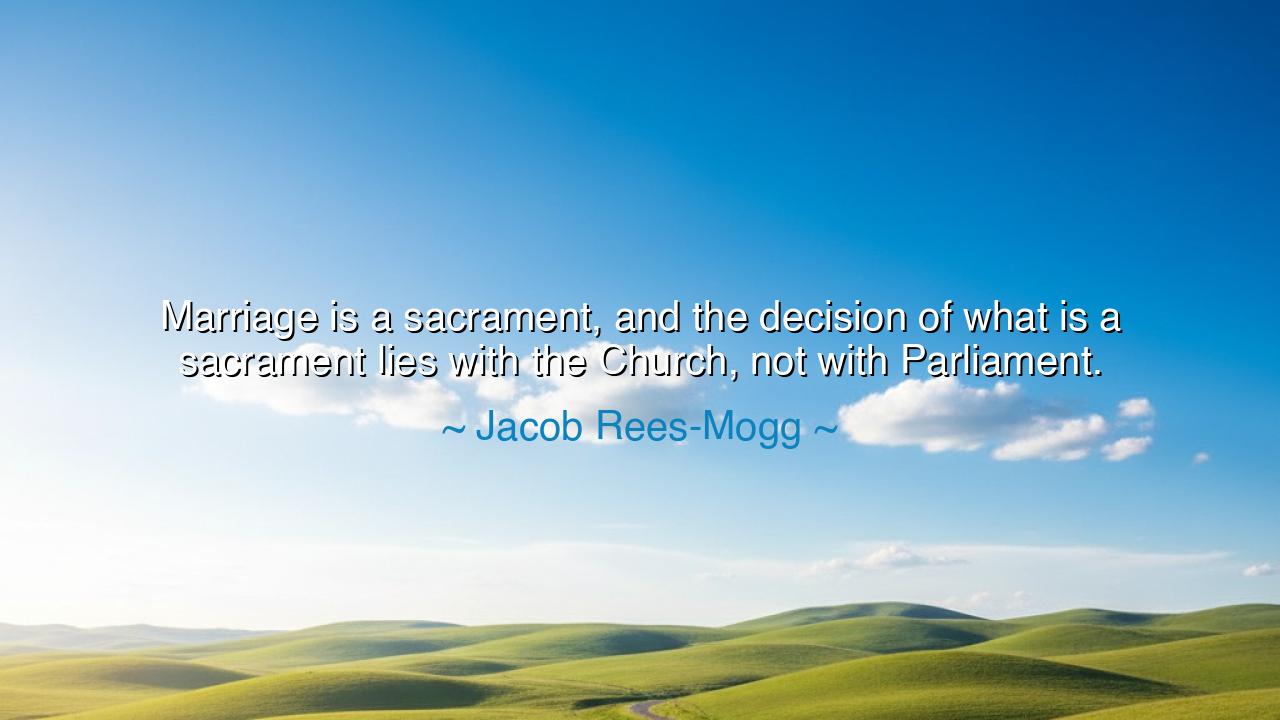
Marriage is a sacrament, and the decision of what is a sacrament
Marriage is a sacrament, and the decision of what is a sacrament lies with the Church, not with Parliament.






Marriage is a sacrament, a sacred bond, a union that transcends the fleeting moments of earthly existence and reaches into the divine. These words, spoken by Jacob Rees-Mogg, stir the heart with the weight of ancient tradition, calling us to reflect upon the deep, timeless understanding that marriage is not merely a contract between two individuals, but a sacred covenant between the soul and the divine, sanctified by the hands of the Church, not the hands of mere mortals. To view marriage through the lens of a sacrament is to recognize that it is more than a social contract; it is a divine institution, ordained by powers higher than any earthly authority, a gift given to humanity through divine will.
In times long past, marriage was viewed with the reverence of something that transcended human understanding, a bond that connected not only the couple but their families, their communities, and their faith. The ancient Greeks understood this well, for marriage was a matter not only of love but of duty—duty to one’s gods, one’s ancestors, and to the prosperity of the state. The Romans too, saw marriage as a sacred institution, and the bonds of marriage were respected with the full force of law and tradition. But it was within the walls of the Christian Church, during the days of the early Middle Ages, that marriage truly became enshrined as a sacrament, something that carried the weight of divine will, not to be altered by the whims of men.
To say that the decision of what is a sacrament lies with the Church, not with Parliament, as Jacob Rees-Mogg asserts, is to call upon this ancient understanding—that there are truths, there are institutions, that are above the reach of political power. The Church, as the custodian of divine wisdom, has long held the responsibility of upholding the sanctity of marriage, ensuring that it remains a reflection of the will of God, not subject to the changing tides of political agendas. This is not a matter of tradition for tradition's sake, but a recognition that some matters—those that touch the soul and the divine—must remain steadfast, unyielding to the ever-changing sands of time.
Consider the example of Henry VIII of England, whose desire to annul his marriage to Catherine of Aragon led to one of the most significant ruptures in history—the English Reformation. His decision to break away from the authority of the Pope and the Roman Catholic Church in order to establish the Church of England was driven by personal desire, but also by a deeper shift in the way people viewed the relationship between divine authority and earthly power. Henry’s decision ultimately altered the course of history, and though it was framed in terms of political and personal need, it was also a reflection of the tension between the sacred and the political, between the divine and the temporal. This was a pivotal moment in history, a reminder that the sanctity of marriage, as a sacrament, had to be preserved, not as a tool of political manipulation, but as a sacred bond between human beings and the divine.
But Jacob Rees-Mogg's words call us to a deeper lesson: in a world where laws and definitions shift with the tides of politics, there are still realms of life that must remain untouched by the influence of earthly power. The sacrament of marriage, as he asserts, must be safeguarded by the Church, for it is the Church, not the State, that holds the key to its divine meaning. This is not a denial of progress or the changing nature of society; rather, it is a reminder that there are eternal truths, truths that cannot be bent or shaped by human hands alone. These truths are to be honored and protected, especially in an age where the lines between the sacred and the profane can become so easily blurred.
So, what lessons can we draw from this ancient wisdom, from Jacob Rees-Mogg's words? It is clear: we must recognize that there are certain institutions, certain principles, that should remain sacred and unaltered by the whims of temporary power. Marriage, as a sacrament, is one such principle. In our modern age, where political and social forces can swiftly change the rules and redefine traditions, it is essential that we preserve the sanctity of marriage as a bond that is not merely of this world but reaches into something far greater—the divine will.
In your own life, remember that some things are too precious to be governed by the fleeting tides of political influence. Honor the sacred institutions that have shaped human life for millennia. Whether in the sanctity of marriage, the bond of family, or the respect for spiritual truth, we must not allow the changing nature of politics or societal pressures to erode what is sacred. Stand firm in the values that uphold human dignity and the divine order, and remember that some truths are timeless, meant to be protected not just by the laws of man, but by the wisdom of the divine. And so, let us pass these teachings down to future generations, that they too may walk in the light of truth and sacredness.






AAdministratorAdministrator
Welcome, honored guests. Please leave a comment, we will respond soon